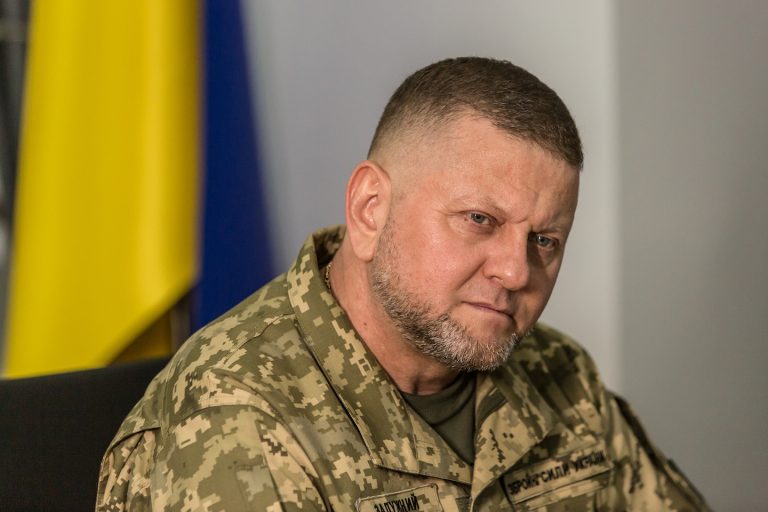President Volodymyr Zelensky informed General Valery Zalozny on Monday that he would be removed, but as of Friday morning no official order had been received to remove him as commander-in-chief of Ukraine's armed forces, according to a senior official. He spoke on condition of anonymity because he was not allowed to speak publicly. Zalozny's relationship with Zelensky has been tense for months, amid a failed counteroffensive last year, but tensions escalated at Monday's meeting, partly due to disagreement over the number of new troops Ukraine needs to mobilize.
Zalozny, who has not backed down in his clash with the president, wrote an op-ed for CNN, published late Thursday evening, in which he called for a “comprehensive redesign of operations on the battlefield — and an abandonment of outdated stereotypical thinking.”
While the article did not mention Zelensky by name, it was a notable rebuke to the president who had resisted Zalozny's call to mobilize nearly 500,000 new troops, saying he was not convinced it was necessary.
Zelensky also publicly criticized Zalozny's comments in an interview with The Economist in November, in which he said the war had reached a “stalemate.” The assessment that the battle lines have mostly stagnated and that the war is one of overwhelming attrition, with little forward movement by either side, is now widely accepted as fact.
“We have to acknowledge the significant advantage the enemy has in mobilizing human resources and how this compares to the inability of Ukraine’s state institutions to improve the manpower levels of our armed forces without using unpopular measures,” Zalozny wrote in his article. CNN.
Zalozny has not commented publicly on reports of his dismissal, which represents a significant risk for Zelenskyy given the general's popularity within the military and more broadly among the Ukrainian public. There are already signs of backlash among commanders on the battlefield, and there is no indication that the new commander will be able to bring any rapid improvement to Ukraine's difficult battlefield position.
Zelensky's spokesman, Serhiy Nikiforov, denied on Monday that the president had fired Zalozny, but has not responded to an updated request for comment since then. With Russia escalating its attacks at many points on the battlefield, and with reports of Zalozny's dismissal spreading in the Ukrainian and international press, every day that passes with Zalozny remaining in office raises questions for Zelensky and the head of his presidential administration.
Government and military officials, speaking on condition of anonymity due to the sensitivity of the case, said they expected the official dismissal decree to be issued this week.
The CNN article, which described Ukraine's military challenges in blunt terms, provided an example of Zalozny's sometimes candor, which has drawn the ire of the president and his senior advisers, according to Ukrainian and Western officials.
On Friday morning, Zelensky's press office did not respond to requests for comment on Zalozny's article, which appeared to be a kind of farewell as well as his vision of how to defeat a much larger and better-armed Russian invading force. Russian forces currently occupy about a fifth of Ukrainian sovereign territory, including Crimea, which Moscow invaded and illegally annexed in 2014.
In his article, Zalozny said Ukraine “must deal with declining military support from key allies” who are “grappling with their own political tensions.” A nearly $60 billion aid package proposed by the Biden administration has stalled in Congress amid opposition from some Republicans. The European Union on Thursday approved a nearly $54 billion aid package after delaying it for weeks due to opposition from Hungarian Prime Minister Viktor Orban.
“Our partners’ stocks of missiles, interceptor air defense systems and artillery ammunition are exhausted, due to the intensity of hostilities in Ukraine, but also due to the global shortage of fuel shipments,” Zalozny wrote.
Zalozny also criticized the “weakness of the international sanctions regime” imposed by Ukraine's Western partners, which, he said, means that “Russia, in partnership with certain other countries, is still able to deploy its military-industrial complex in an effort to wage a war of attrition against us.” “.
He suggested that the key to Ukraine's victory would be a comprehensive future upgrade of warfare capabilities including drones.
“Ukraine’s first priority should be to create a full arsenal of (relatively), modern and highly effective unmanned vehicles and other technological means,” such as electronic warfare and cyberwarfare, he wrote.
“The challenge facing our armed forces cannot be underestimated,” he wrote. “It aims to create a completely new state system of technological rearmament.”
One benefit of the high-tech strategy is to provide real-time intelligence to Ukrainian forces, “wearing down” the enemy and putting “fewer soldiers at risk, thus reducing the level of casualties,” he said.
Zalozny pointed out that it will not take Ukraine long to achieve this comprehensive reform.
“Taking everything into account at this moment, we believe that creating such a system can be achieved within five months,” he wrote.
Kostyantin Khudov in Kiev and Isabel Khurchudyan in Dnipro, Ukraine, contributed reporting.

